
Steve Lefkowitz: Staying Grounded to Fly Higher
Thursday, February 13, 2020
- Team CYPRES
- 2/13/20
- 0
- General, Sponsored Athlete
Steve Lefkowitz Opens Up the Rhythm Machine to Our Curious Eyes
We’ve all been watching the journey of Rhythm through the years — and the buildup to this year’s Nationals was downright nail-biting. Through it all, we know you’ll agree when we say that it is downright fascinating to watch SCD Rhythm XP prove the ironclad strength of their system with a jump-off win this year. But that do those systems look like behind the scenes? We sat down with Steve Lefkowitz to get some great advice on team-building, -maintaining and -enriching.
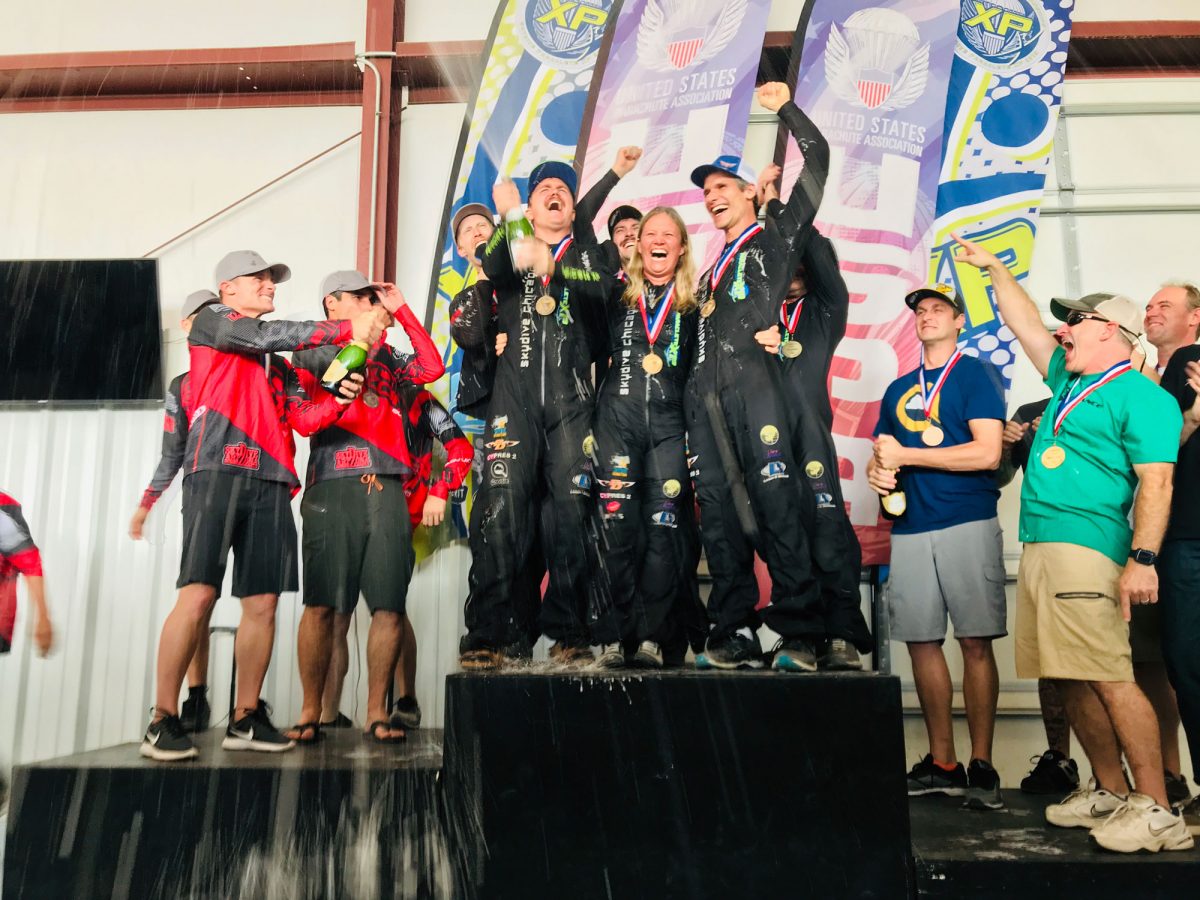
Q: What has allowed your team to stay with it for so long and stay so graceful through the highs and lows alike?
Steve: First of all, I personally feel motivated by the challenge of getting better. As long as there’s an opportunity to continue to improve, I’ll want to keep going. It’s not an all-or-nothing situation. It’s not that not winning is not disappointing; each time we didn’t win, I was disappointed. But that doesn’t mean I ever felt like I should quit. I can feel rewarded and super proud of what I’ve done and at the same time be disappointed. Those seemingly opposed positions can coexist.
Secondly, I don’t see the [13] years before winning Nationals as failures. To come in 2nd at Nationals is still really great, as far as I’m concerned. We did win the indoor championship at Paraclete back in 2017, and we’ve come in the top three several times internationally, at World Cups and at the Dubai International Championships. Whenever we’ve pushed ourselves to be our best, that’s rewarding, regardless of whether or not we win. That perspective makes an actual win that much better.
But winning isn’t the only thing that drives me — or us. Outside of the competition, there’s the camaraderie of the team, there’s the coaching; there are the many things we do to give back to the community. Looking at that all together, why would I ever want to stop?
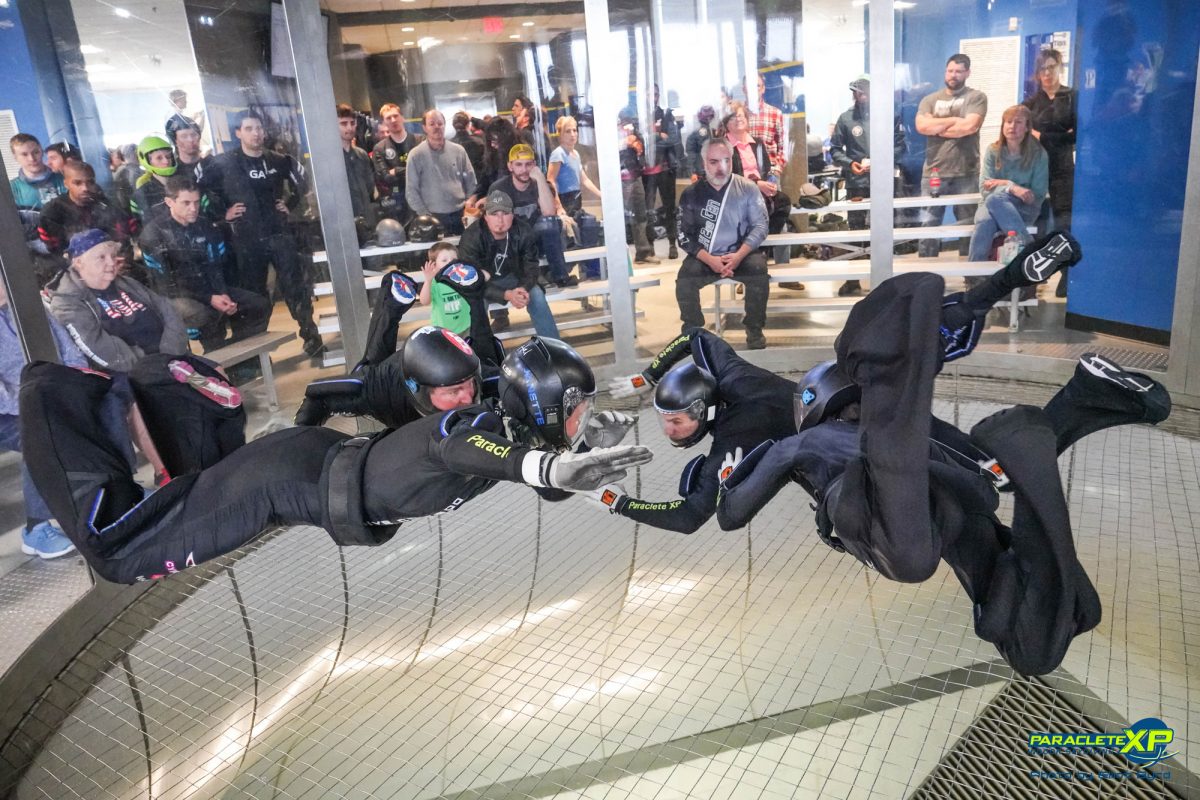
Q: How do you measure your level of success? So much of what keeps you driven is seeing your own personal progress, but that personal progress, at least in 4-way scoring, is based on other people. With the lineup changes that Rhythm has had through the years, you’ve made significant progress and then been in a situation where you had to bring on new teammates. How have you kept your drive going through that start/stop cycle?
Steve: Some of the hardest moments have been when we’ve had to take a step back. However, if I can see a path to getting better, that’s still motivating. For example: I could see [when teammates Doug and Andrew arrived on the team] that, even when we first started and weren’t doing the same scores we had left off with, that with this team we could go farther. Seeing that potential, even though I knew it might take a while to get there, is motivating.
Q: So much of 4-way is about team culture. When you’re in the realm of skydiving that Rhythm occupies, chemistry is as much a part of the road to success as the number of jumps you make in a training year. How do you keep the positive team culture and chemistry while competing so hard at the very top level of the sport?
Steve: The short answer is that we consider chemistry when we bring on new teammates. Every time we’ve had to rebuild, we’ve had the opportunity to consider people who might be as qualified athletically but yet who didn’t fit — maybe based on their personality, or their goals, or their commitment. We’ve had to make really tough decisions.
The temptation is to select the group that’s going to score us the highest right now. On Rhythm, we’ve made the tough decision to select the group that’s going to be the best team. Talent is obviously part of that, but commitment and compatibility are no less important. We don’t seek to be four people with the same personalities, but instead a compatibility of values alongside a necessary minimum skill level.
We are quite detailed in this regard. We’ve developed questionnaires to identify the things that are important to us in a potential teammate. We have meetings that help us reinforce and keep those values at the forefront.
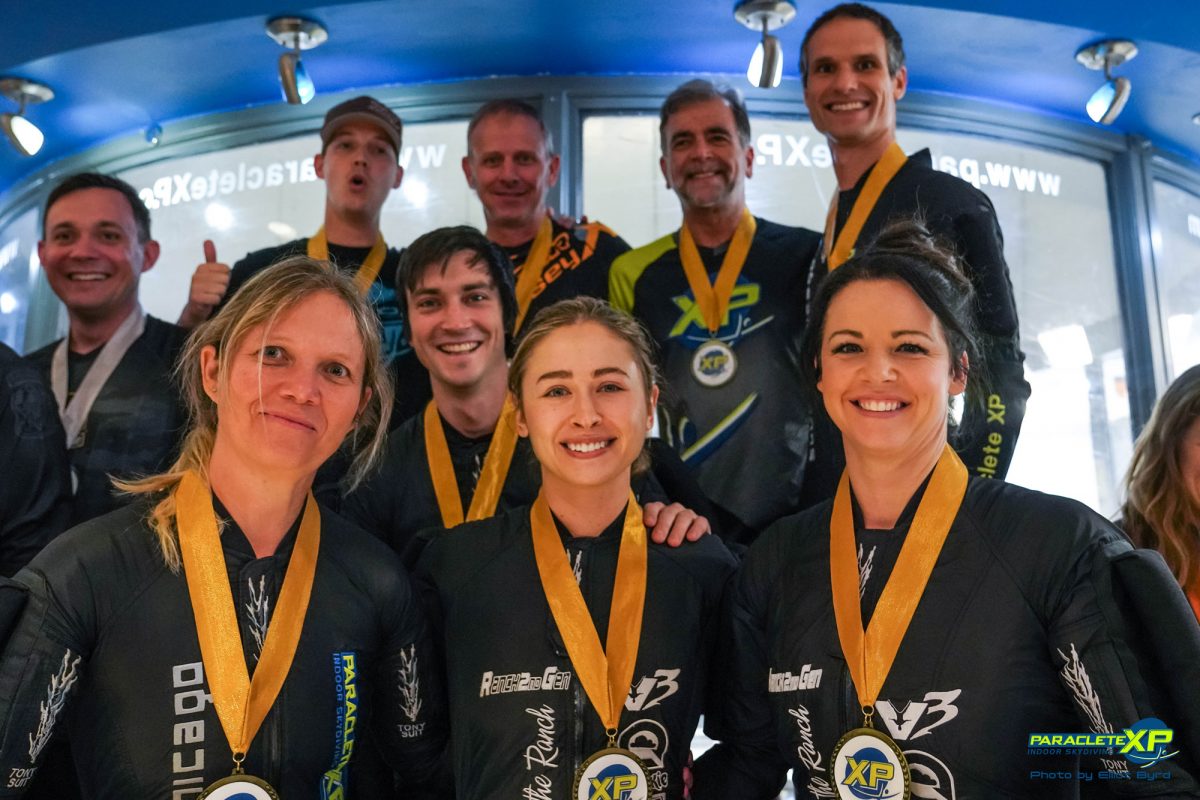
Q: All of that highlights the legendary cohesion that appears to define your team — but tell me about the independent aspects of team life.
Steve: It’s important to keep focus on both sides of the coin: on one hand, the vision of the team in the future, and on the other, one’s individual opportunity to improve. I can say to myself I am going to get better at turning in place. I am going to get better at building this formation quicker. I am going to get better at my exit. While those dynamics are affected by my teammates, I take personal responsibility for doing everything the best I can independently of what my teammates do, and I expect them to do the same. Furthermore, those students of mine who are able to recognize that no matter who you are with, you have an opportunity to improve, those students are the ones who continue to grow the quickest.
Honestly, that’s why I can go out and do a fun jump with a beginner and find things that I am going to challenge myself to improve, whether it’s something in my own flying or how effectively I can communicate with my students.
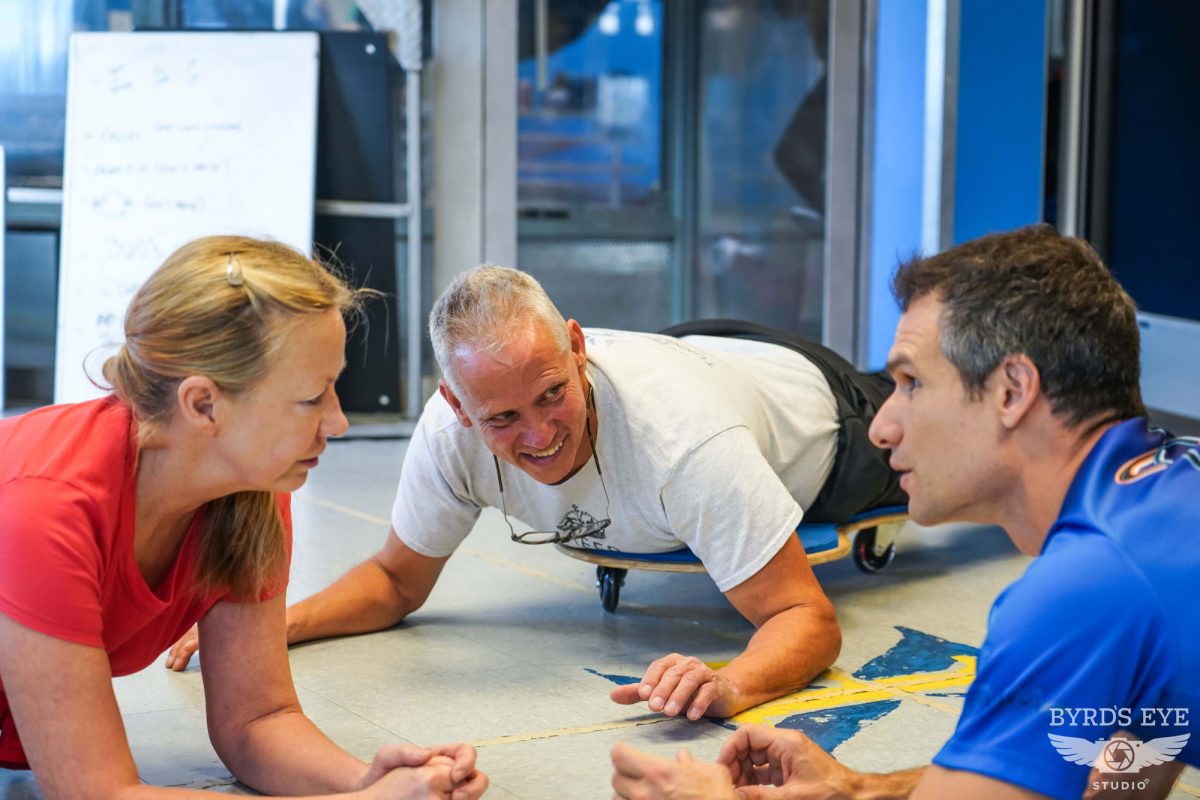
Q: Let’s talk about the Nationals. Can you share with me what your expectations were going in, and some of the key moments within the competition?
Steve: Prior to Nationals, Doug had just come back from being out for about a year. When we came back, our goal was to get to the level we were at before Doug’s injury. That was around the 25-point average. We had done 25-and-over twice in the last couple of weeks before his injury, and our goal when he returned was to get back to that level. Honestly, I thought that was a very lofty goal. He started jumping again in April. It was then four-and-a-half months to just get back to what we were doing before.
A month prior, we still weren’t there — but, during the week of training we did at Raeford just before the Nationals, we made a big leap. All of a sudden we were back to scoring at or above what we were doing before Doug’s injury. That leap in our practice performance gave me much greater confidence in what we could do at Nationals.
Going into the Nationals, as with every competition, we did not focus on what other teams might do. We were simply going to do our best and see where that put us. Of course we wanted to win, but [focusing solely on winning] adds pressure that can be a detriment to performing at our best.
For me, I feel like it’s important to put the implications aside. I tried to focus less on whether or not we’d win, and instead place that focus on keeping the attitudes and mindsets that allow me and my team to do our best. Prioritizing that is reliably our best chance to win; and if we don’t win but perform at our best, we will still be very proud.
Q: You prescribe competition for pretty much everyone you coach. Why is that?
Steve: Going to competition is very important. Often people I coach focus on the costs of competition. Yes, competitions cost more than regular training, and you do fewer jumps than you would in a training day. However, what you gain in the experience of competing is so much more valuable than those costs. Performing at your best in competition requires a unique set of performance skills that can only be developed through the real thing. There is nothing like competition, and as much as you may try to replicate a competition scenario in practice, it will not be the same as being there.
Over multiple competitions, you’ll experience coming back from a bad round, staying calm after an awesome round, and keeping the best mindset for your optimal performance whether you’re behind, ahead, or neck-and-neck. Competition builds the resilience to handle all the different experiences that might happen. Only after attending many competitions can you confidently say to yourself, I have been here before, and I know how to keep doing my best no matter what happens! You may be the best skydiver in the world, but still lose on “performance skills” if you don’t have that experience under your belt.
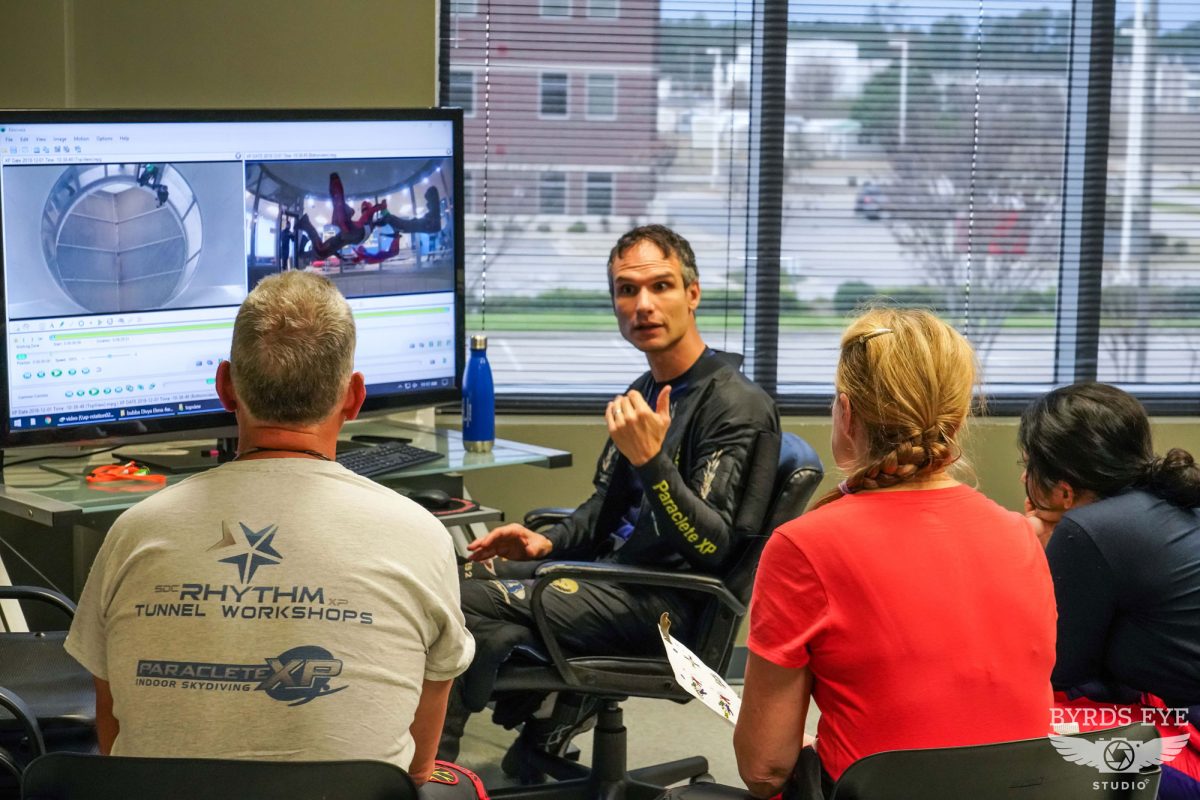
Q: Do you think mental toughness is talked about enough with skydiving competitions?
Steve: Within Rhythm, we talk about it all the time. At the top level, it is huge and understood to be huge. When there are rainy days and it’s time to give seminars, one of my favorites is Mental Toughness for Performance. it’s not just for competition, either. Even for newer skydivers, mental toughness and the ability to set aside distraction is absolutely necessary.
Our sport is unique in how short of an amount of time you get to practice. Perhaps it’s that shortness that drives a special attention to the mental aspect of the sport. When you’re jumping, you can only perform 10 to 20 minutes of your sport, even on a good day. You have to be focused on the mental aspect to get the most out of each and every minute.
Q: Do you coach each other in competition?
Steve: We are very deliberate about the extent to which we coach each other in a competition. We believe that to do our best relies enormously on trusting ourselves and each other. What that means practically is that we give minimal coaching to each other during the competition itself.
If I had something to remind my teammate about — to do differently, or better — I push myself to trust two things. 1: My teammate already knows what I would ask for. 2: My teammate is the best judge of what they should have in their head to perform at their best. With both those thoughts in mind, if I distracted my teammate from what they were already thinking, any request I would make could actually be a detriment to their performance. It’s imperative that I trust them to know what’s best for them to be thinking about in the moment.
There is a lot of deliberate not-talking in later competition rounds. We have a couple of keywords: stay focused; attack. In this Nationals, we were almost laughing about it as we were approaching the ninth round. Someone would say to the group stay focused and attack for the 9th time, but we all know that’s what we were all thinking just then.
Q: Staying focused is a trick, though, in the midst of the moment. Particularly in the jump-off, when everybody’s excitement for you was reaching a fever pitch, right? What was it like, dealing with the energy and excitement after the 10th round?
Steve: I’m pretty good about being in my own world. And when there are big distractions, trusting and sticking to our routine can be a helpful way to tune them out. We hold ourselves accountable to staying to that routine.
[In competition], we know exactly when it’s time to go to the loading area. We pick up our helmets the same way and lay them down the same way together. We know when it’s time to go to mockups, and we go as one. It all helps us deal with distractions and reduce stress. It’s meditative. When you find that you’re distracted, you catch yourself, and you go back to the next step in your process.
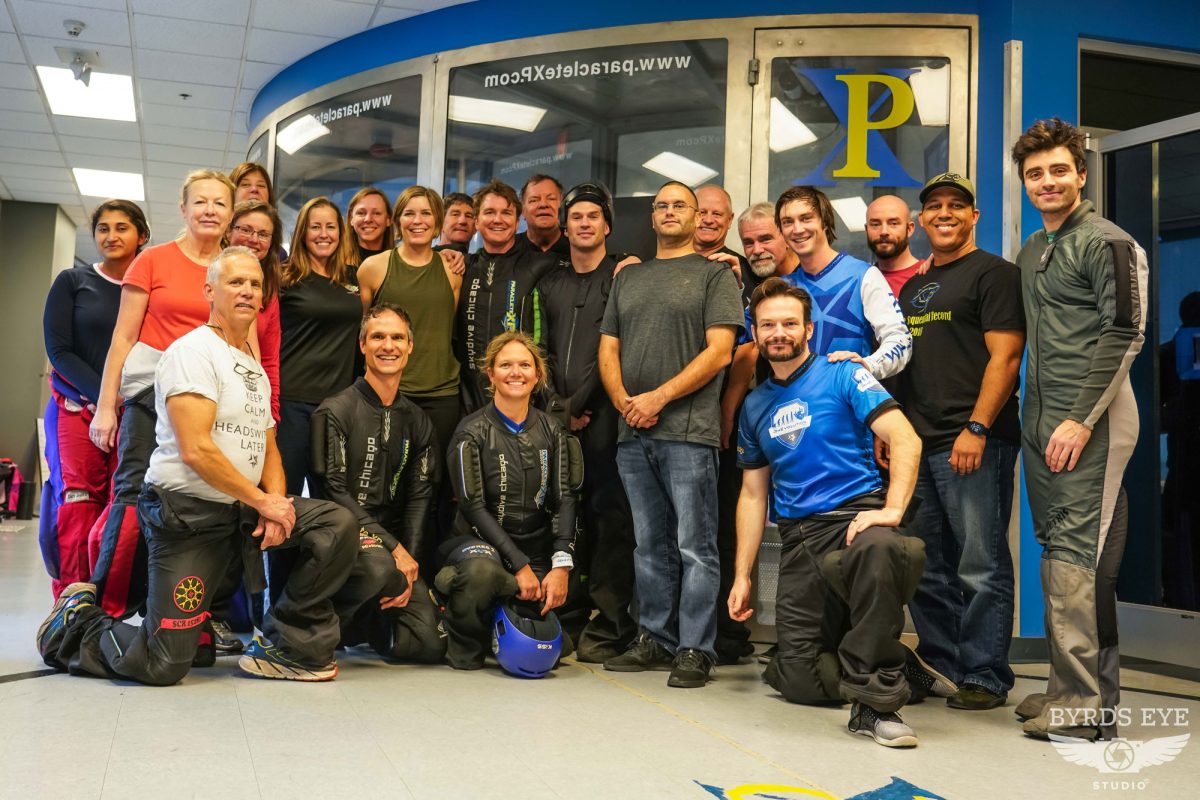
Q: What’s it like to compete and mentor at the same event?
Steve: I enjoy it. I personally find it to be a tool for myself at competitions to seek out other teams — especially at Nationals — and see if there is a way I can provide coaching or help. It keeps me grounded and distracts me from the stress of competition.
Many times, I will hold myself back from saying something, because I know teams need to trust each other to know what’s best for them in the moment. I don’t give tons of feedback when a team is about to go up and compete, but — at the same time — if I see something I can clearly help with, I will. And when a team that’s competing asks me for my advice on something, I’m happy to help. I think it helps me as much as it helps them.
Q: In 2020, Rhythm will be preparing for the World Meet in Russia. Are you doing anything differently, or adding something new?
Steve: It promises to be a very busy season. We’re really packing in as much training as we can before August. It’s more intense, with more days on the calendar. It has been a while since we have had outside coaching, and we always think that’s valuable, so we’re looking at doing that too.
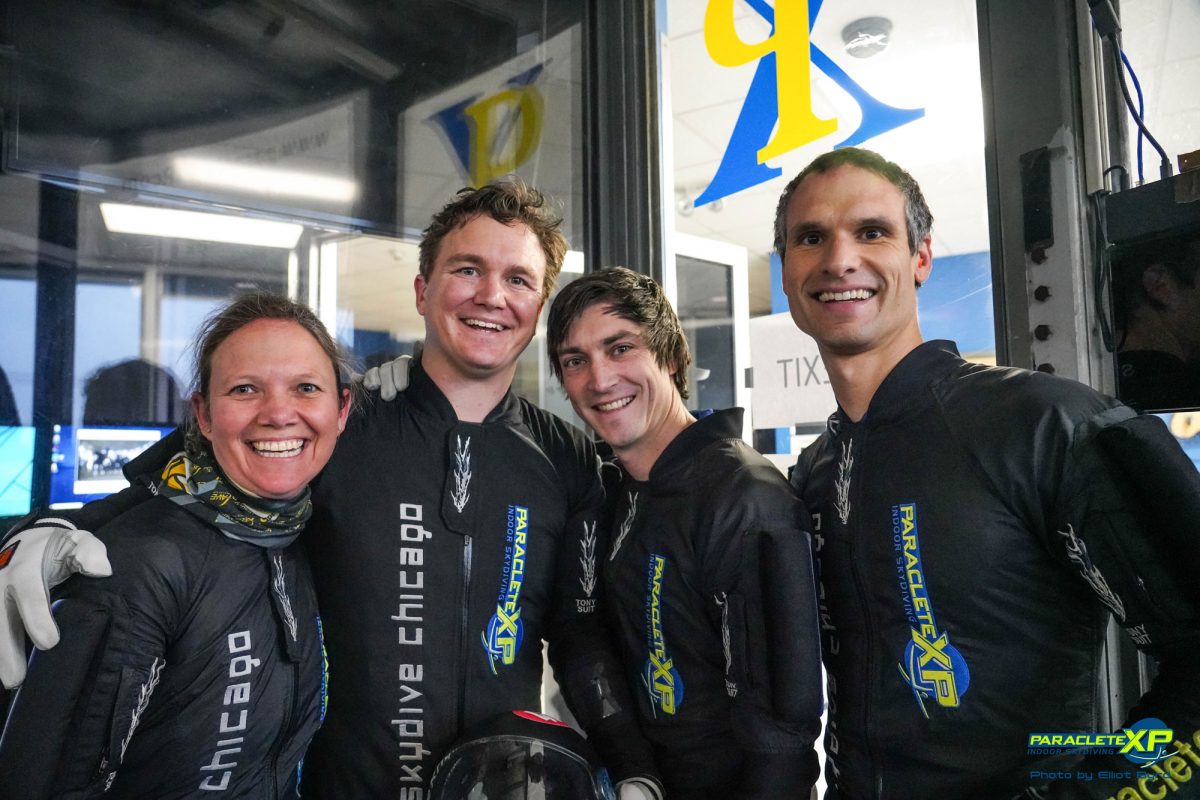
Q: The idea that you can make a living at this at all is so mind-blowing, especially the way guys are doing it. You guys work so hard. Do you ever get tired?
Steve: We work very hard at what we do, but I always keep in perspective that it’s still just skydiving. As important as it feels to me – and I have dedicated over a decade of my life to this – I always keep perspective that we’re not solving world hunger here. I’m fortunate enough to get to do something that’s a lot of fun, which I really enjoy, and somehow I’ve made a living out of it. Any time I get absorbed in how hard I’ve been working, I remind myself that many people work much harder doing something that’s much less rewarding or fun. We work hard, yes, of course — but how hard is hard when it’s skydiving we’re talking about?
Tags: coaching, CYPRES Athlete, Mindset, RhytmXP, Sponsored
Adventure, Tips, and Adrenaline
Subscribe to Our Newsletter
By signing up for our newsletter you declare to agree with our privacy policy.

